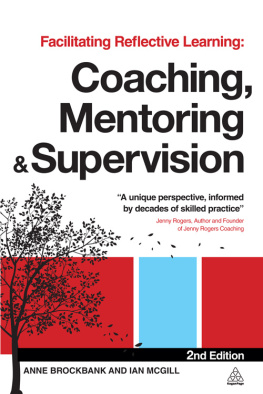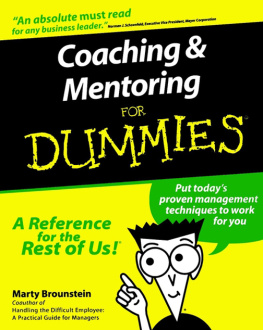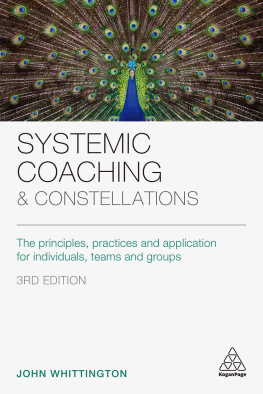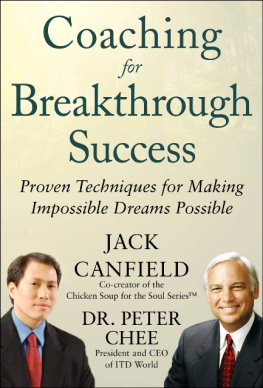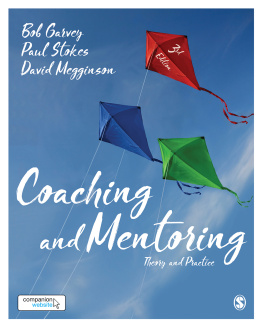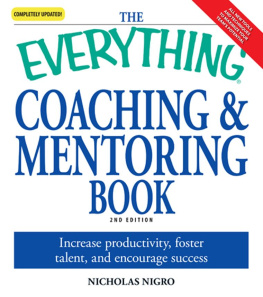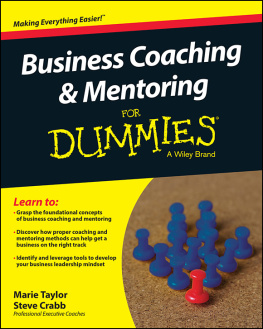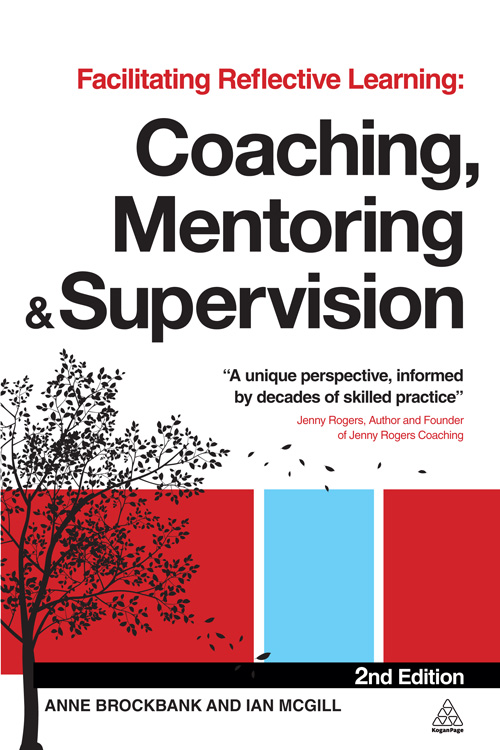Note on the Ebook Edition For an optimal reading experience, please view large
tables and figures in landscape mode. |
This ebook published in 2011 by
Kogan Page Limited
120 Pentonville Road
London N1 9JN
UK
www.koganpage.com
Anne Brockbank and Ian McGill, 2006, 2012
E-ISBN 978 0 7494 6508 7
CONTENTS
PART TWO What is the difference between coaching and mentoring?
09 Engagement
14 Conclusion
O nce again we express our appreciation of our colleagues, mentors, coaches, clients, participants on our courses, friends and family, all of whom have contributed to this book in their own individual ways. In particular we are grateful to the reviewers of our first edition, Jenny Rogers and Lise Lewis, who gave important guidance in preparation for this second edition.
We are grateful to our academic colleagues, Professor Yvonne Hillier of Brighton University and Professor David Megginson of Sheffield Hallam University for their valuable and incisive guidance. We recognize the role of our colleagues at City University where much of the material has been tried and tested. In addition, we acknowledge the contribution of the Masters students who participated in the Mentoring Coaching and Supervision modul e from 1995 to 2005 for the challenges and development they provided.
We extend our appreciation to our mentoring and coaching clients and for the insights we have gained through our relationships with them which support many of the ideas we present here. In our preparation and training of mentors and coaches for corporate clients we have been made aware of the variety of contexts in which mentoring and coaching activities are carried out.
We are grateful to Gerard OConnor for his provision of diagrams in and Dr Alison OConnor who advised us in our initial discussions about the map of mentoring and coaching approaches.
We appreciate the role of our case study authors and contributors in illustrating many of our ideas, including: Alison Lyon and Eve Bazely of NCH, the childrens charity; Jan Kay and Les MacDonald for the First Nation case; Patricia Easterbrook and Claire Siegel for the Professional Awarding Body case; Helene Donnelly, Forensic Paper Conservator and Founder of Data & Archival Damage Control Centre; Dorothea Carvalho, Director, Chartered Institute of Logistics and Transport; and Robert Clasper-Todd, Training Manager, Addaction.
In addition we would like to thank Nathalie Tarbuck of Two Minds To gether for permission to include her coaching evaluation form in .
Our own experience of mentoring and coaching has influenced the content of the book and we acknowledge our debt to our past mentors and coaches, who have influenced and inspired our endeavours. These include Annes violin teacher Helen Hogg, her private mathematics tutor David OConnor, her trainer/supervisor Eunice Rudman and academic mentor, Professor Gary Davies, as well as Ians teachers T Broadhurst, Mrs E Cox, and tutors Brian Thomas and Jack Greenleaf.
We also recognize the support of the editorial team at Kogan Page, including Helen Kogan, Martina OSullivan and Sara Marchington, who have enabled us to bring the book to publication.
Anne Brockbank ( Anne.Brockbank@mailbox.ulcc.ac.uk ) and Ian McGill ( Ian.McGill@mailbox.ulcc.ac.uk )
T he revised edition is for those who practise mentoring or coaching as well as for those clients who are interested in the mentoring and coaching process and wish to make best use of their experience as clients. We include coaches or mentors in training as well as those experienced in the field who may wish to review their practice.
The book may also be useful for those responsible for staff and management development in organizations who are involved in creating mentoring and coaching programmes. The revised situational framework for coaching and mentoring may help clarify how such programmes can be used for organizational transformation.
Our experience in the field as coaches and mentors, as well as designers of mentoring or coaching programmes for corporate clients, is the basis of this book, as is our experience of designing and running postgraduate programmes. We seek to build a theoretical base for professional practice which supports individual learning as well as organizational learning and change.
Readers who are more interested in practice than theory may choose to leave aside ). Readers who are new to mentoring and coaching theory may want to absorb the material in Parts One and Two before moving on to our reports of practice in Part Three, which takes the reader into the different contexts for mentoring and coaching. Part Four deals with accreditation, diversity, ethical standards and the need for supervision.
FIGURE 0.1 How to use this book: alternative routes

The terminology of mentoring and coaching in the literature has been confused and remains confusing. Sometimes the words are used interchangeably with little or no agreement on their meaning. Academics have tended to position coaching as an activity which aims at performance only, meaning a minor adjustment to behaviour, whereas they have linked mentoring to a transformational learning outcome, where the learner experiences a total change in how they view the world. However, the recent expansion of coaching as a developmental method insists that coaching aims at transformation as a learning outcome, and mentors are simply company advisers or even inexpensive tutors. Organizational programmes, unless clearly defined, have the potential for disappointment for mentors, coaches and clients alike.
We aim to clarify the meaning of the terms mentoring and coaching by relating them to the following questions:
W hose purpose? Is the purpose of the coaching or mentoring owned by the employer, the organization, the coach, the mentor or the client?
W hat process? Is the process didactic, impositional or humanistic?
W hich learning outcome? Is the likely outcome performance, adjusted behaviour or transformation?
Mentoring and coaching may be clearly defined by taking into account the purpose, the process and the potential learning outcome in a coaching or mentoring contract.
Part One is about theory. We set out the origins of our work in a theoretical account which underpins our practice. Alongside theory we declare the values with which we approach mentoring and coaching. In we assert that the process of mentoring or coaching has one clear purpose, th e learning and development of an individual. This process involves change, which may be one of modest improvement or of radical change where the outcome may be transformational. Thus we present a framework of approaches to mentoring and coaching which identifies the activities by their purpose, process and hence their learning outcome. Because each mentor or coach will have their own belief system, it is crucial that they take time to examine this, however embedded it might be, and make this known to prospective clients. We identify four categories of mentoring or coaching:
Performance mentoring or coaching, where objectives may be imposed as in performance management.
Engagement mentoring or coaching, where persuasive methods may be used to align personal aims with organizational objectives.

